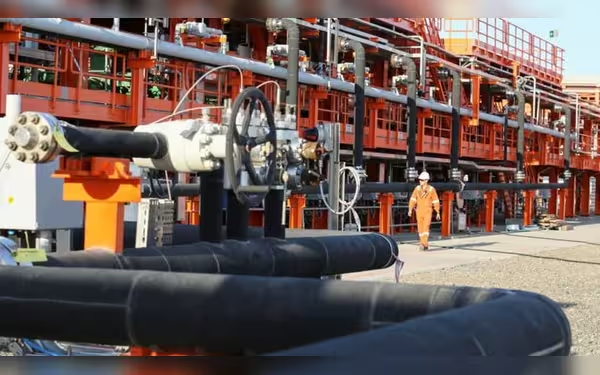Saturday, November 16, 2024 09:54 PM
Kazakhstan Advances Multi-Billion Dollar Claims Against Oil Firms
- Kazakhstan seeks $16.5 billion from oil companies.
- Arbitration results expected by December 2023.
- Kashagan oilfield crucial for Kazakhstan's economy.
 Image Credits: channelnewsasia
Image Credits: channelnewsasiaKazakhstan is making progress in multi-billion dollar claims against oil firms, with results expected by December 2023.
Kazakhstan, a country in Central Asia, is making significant strides in its legal battles against international oil companies. The government is currently involved in multi-billion dollar arbitration proceedings concerning its major oilfields, Kashagan and Karachaganak. These proceedings are expected to yield preliminary results by December, as stated by the country's energy minister.
Last year, Kazakhstan initiated claims against the companies involved in these oilfields, seeking $13 billion from Kashagan and $3.5 billion from Karachaganak. The disputes primarily revolve around costs that the government believes have been inflated by these foreign firms. This situation has led to accusations of “resource nationalism,” where the government is perceived to be increasing its stake in vital oil and gas projects at the expense of foreign investors. However, Kazakhstan's authorities have firmly rejected these claims, asserting that their goal is to control excessive costs.
The Kashagan oilfield is particularly noteworthy, as it is one of the largest oil discoveries in recent decades. It is developed by a consortium that includes major players such as Eni, Shell, TotalEnergies, ExxonMobil, KazMunayGaz, Inpex, and CNPC. This consortium, known as the North Caspian Operating Company (NCOC), has invested around $50 billion into the project. Similarly, the Karachaganak field has seen investments exceeding $27 billion from its partners, which include Chevron and LUKOIL.
Despite the ongoing disputes, the energy minister, Almasadam Satkaliyev, emphasized that the details of the claims are confidential, stating, "Everything, which relates to the subject of the claim, is confidential information." This lack of transparency has raised eyebrows, especially since reports have suggested that Kazakhstan's arbitration claims against the Kashagan consortium could exceed $150 billion.
Historically, Kazakhstan has had a tumultuous relationship with foreign oil companies. In 2020, the government reached a $1.9 billion settlement with the Karachaganak partners, which ended a long-standing dispute over profit sharing. Additionally, in 2011, the Kashagan consortium agreed to cover $1 billion in extra costs incurred by the state energy company, KazMunayGaz, to resolve another dispute.
As the largest economy in Central Asia, Kazakhstan is heavily reliant on the Kashagan oilfield for its economic future. The field's crude oil is particularly challenging to extract due to high levels of poisonous hydrogen sulfide, which complicates the production process. Last year, production from Kashagan reached approximately 380,000 barrels per day.
In a related development, Kazakhstan's oil exports to Germany via the Druzhba pipeline are projected to be around 1.2 million metric tons this year. Germany is keen to double its imports to 2.5 million tons annually, especially in light of Western sanctions against Russian oil due to the ongoing conflict in Ukraine. While Kazakhstan maintains its alliance with Moscow, it has not taken a definitive stance in the conflict, which has allowed it to expand its role as an oil exporter.
Kazakhstan's ongoing arbitration proceedings against international oil companies highlight the delicate balance between national interests and foreign investment in the energy sector. As the country navigates these complex legal waters, the outcomes of these claims could significantly impact its economic landscape and relationships with foreign investors. The situation remains fluid, and all eyes will be on Kazakhstan as it seeks to secure its financial future while managing its resources responsibly.













